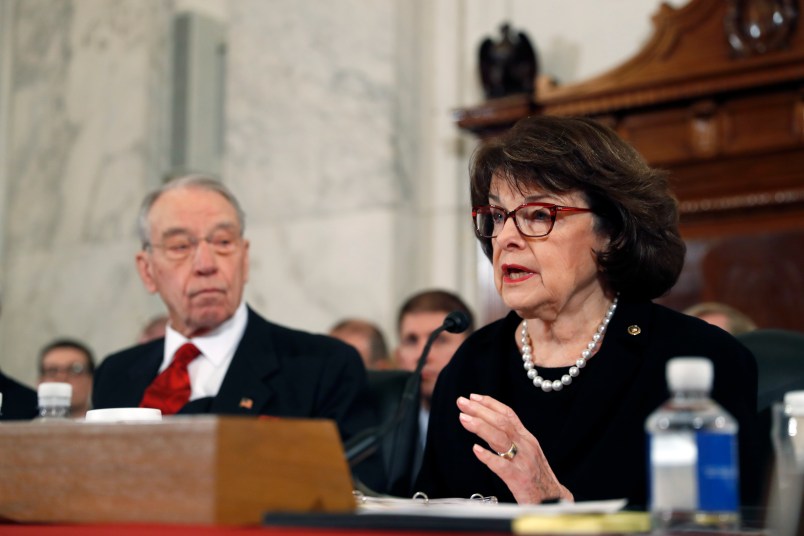One of the many emails coming in this morning in response to this post was from TPM Reader MT. He believes it is wrong and unfair that Democrats are bringing these accusations up at the last moment. To be clear, he opposes Kavanaugh and sees it as a sort of righteous and perhaps inevitable payback for Merrick Garland. But still, he sees it as basically wrong.
From what I can tell, this is actually incorrect on the facts, whatever you think of the fairness of the matter. Here’s what I mean.
From what I can tell (and new facts are emerging by the moment so I may be leaving something out), Sen. Feinstein was the only Democratic Senator who knew about the accusation or knew about it in any relevant detail. Ford had specifically asked her to keep her story in confidence and she said that she did not want to come forward.
Feinstein appears to have honored that request.
Feinstein’s Democratic colleagues were and perhaps are understandably frustrated that this explosive information had been withheld from them. But at least based on the facts as I understand them, Feinstein was honoring the wishes of alleged victim. I don’t see how you can say that was the wrong decision.
Again, from what I can tell, the key moment came when The Intercept published a story last week which reported the letter’s existence and the fact that Feinstein had it in her possession. This seems to have prompted Feinstein to announce she was turning the letter over to the FBI.
This set off a chain of evidence that brings us to today.
The big question is who brought the information to The Intercept. The article itself suggests there were multiple sources. Grim cited “multiple sources familiar with the situation.” Ryan Grim reported that Senate Democrats were asking to see the letter and that Feinstein was refusing. It’s not clear that her colleagues knew what the letter contained beyond there being some serious accusation. Clearly, some group on the Senate Democratic side or people in that orbit brought the news to The Intercept, fearing that time was running out and that potentially important new information wasn’t being disclosed.
If this basic reconstruction is right, Feinstein, her Senate colleagues, The Intercept and even the leakers all seem to have been acting reasonably and with reasonable motives, given their different roles in the process. Nothing here suggests some intentional plot to let Kavanaugh get through the hearings proper and then spring this on him at the last moment. Again, whether or not that would be wrong, it simply doesn’t appear to be what happened.
This brings me to final but I think pretty important point: there’s nothing magical about the designated hearing schedule. There’s some idea here that Kavanaugh is somehow fatally wrongfooted by having this come up after the formal hearing process. That doesn’t make sense. These are explosive charges. They would have been a big deal whenever they came up. Perhaps if they came the day before the final vote there’d be some argument, though even then rescheduling the vote wouldn’t be that hard. This isn’t like we’re holding a trial and the evidence phase is over. There’s no statute of limitations or formal process like that. The truth is the hearings really just ended. So scheduling some more hearings just isn’t a big deal. The charges are a big deal. Making some minor tweaks to the schedule to allow some more hearings is not.
As I said above, there seems to be new information by the hour. So if there’s new information that changes the narrative I outlined above, let me know.






